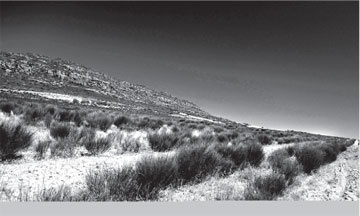Climate change threatens S. Africa's Rooibos tea
Farm workers swing their sickles through red branches, bundling them
up before laying them out in the sunshine to dry. The annual harvest at
Groenkol Rooibos tea estate, in South Africa's Western Cape helps quench
the world's growing thirst for "red bush" tea, but farmers fear that
climate change could destroy the delicate eco-system that their crop
depends on.
 |
|
A picture taken on February 13, 2012
shows the Elandsberg Eco Tourism fields in Clanwilliam, 200
kms north from Cape Town. The annual harvest at Groenkol
Rooibos tea estate, in South Africas Western Cape helps
quench the worlds growing thirst for “red bush” tea, but
farmers fear that climate change could destroy the delicate
eco-system that their crop depends on. AFP |
Annual exports of Rooibos have quadrupled in the past 13 years. The
tea is popular for its perceived health benefits as well as its
refreshing taste and has become a trendy drink in many countries. It
contains no caffeine and just a tiny amount of tannin. But Rooibos tea
only grows in this Western Cape region -- nowhere else in the world.
"Rooibos is endemic to this area, it grows wild here and only here,"
said Chris Du Plessis, who runs Elandsberg Eco Tourism.
"If you go up that hill and down the other side you'll find that 90
percent of the plants that grow there don't grow on the other side."
Very few plants can survive in the dry, sandy terrain but Rooibos bushes
thrive in this area, living in symbiosis with micro-organisms in the
soil. Farmers have tried to grow rooibos in Australia, the United
States, even China -- each time they've failed.
Willem Engelbrecht inherited Groenkol Rooibos Tea Estate from his
father. Since taking on the farm, he's noticed distinct changes in the
weather.
"Over the last 10 years, there are more and more strange things
happening," said Engelbrecht.
The area already endures extreme weather conditions. The temperature
drops to freezing in the winter, and reaches 48 degrees (118 Fahrenheit)
in the summer.
Now, summers are hotter and winters, drier. As a result, Engelbrecht
has had to adapt his farming techniques.How long the boom can last? "In
the past we used to plough the soil, these days we plough less and we
keep material on the soil to act as isolation, basically to preserve the
moisture." But if temperatures continue to soar, farmers such as Willem
will find it difficult to cope, posing risks to the 600 million rand
($78 million, 59 million euro) Rooibos industry.
Climate change experts warn that the Western Cape will be hit hard
over the next 100 years. "A plausible scenario is a further three degree
(Celsius) temperature increase over much of this region," said Francois
Engelbrecht of South Africa's Council for Scientific and Industrial
Research.
"At the same time, this region is projected to become generally
drier. So the general picture that is painted for all of the Western
interior and coastal regions of South Africa is indeed not a very
positive one." AFP
|

